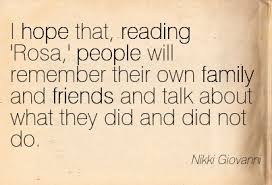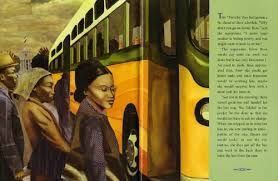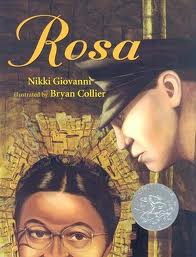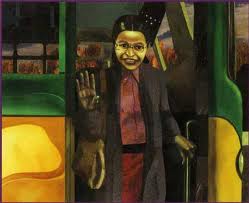
 14:14 Picture Book Challenge Day 11 Christie Wright Wild
14:14 Picture Book Challenge Day 11 Christie Wright Wild
 TITLE: ROSA
TITLE: ROSA
Author: Nikki Giovanni
Illustrator: Bryan Collier
Publisher: Scholastic, Inc
Year:2007 (First edition 2005)
Word Count: 1599-words
Type: Non-Fiction
Summary: This picture book is an account of Rosa Parks’ refusal to give up her seat on a bus in Montgomery, Alabama in 1955, and the subsequent bus boycott by the black community. This book could touch on many elements. But for me, it encompasses the element of plot and dialogue. I choose to focus on the latter.
I did not want to read this book. Not because I didn’t think it was great; but I am writing a picture book (WILLO WALKED THE WALK) about a little girl who walked during the Montgomery Bus Boycott. The story is told from the perspective of a six-year old girl named Willo. When I am writing about a certain subject, I research for months (newspaper, nonfiction books, internet, people, etc.) and take notes. Then I stay away from anything relating to my subject for three months before sitting down to write. This is to make sure none of the writers’ “styles” are stored in my brain. This will allow me to write my “voice” and no one else’s.
But when Kathy Halsey, a Grogger and FB friend, asked me if I have read this book (after reading my manuscript) I immediately ordered the book. My book is not about Rosa Parks. It is about the Montgomery Bus Boycott. But again, we cannot talk about the Boycott and not talk about Rosa; so I get it.
I read this book twice. Once, just to analyze the structure. And another to find the conflict of the text. (I know you are all thinking, “I know what the conflict was back then.”) But I am talking about the conflict in the book.
Literary Conflict is broken down in four categories.
1. Man-versus-man (Character versus another character)
2. Man-versus-society (Character versus people, standards, law, the “masses”)
3. Man-versus-nature (Character versus natural elements – blizzards, tornado, rain, earthquake, etc.)
4. Man-versus-self (Charater versus their own thoughts and dilemma. What should the character do?)
This book touched on all four categories.
1. Man-versus-man
The first conflict was Rosa-versus-bus driver.
While Rosa was daydreaming, the bus driver instructed the “colored” folks to give up their seats.
“I said give me those seats!” the bus driver (James Blake) bellowed. “You better make it wasy on yourself. I’m going to call the police.”
“Do what you must,” Mrs. Parks quietly replied.
This conflict is classic. It is Mrs. Park and the bus driver in a boxing match. Their gloves were words. Round for round. Punch for punch. Jab for jab.
2. Man-versus-society
The societal conflict encompasses many – Jim Crow, Segregation, Treatments of blacks.
But I want to share the conflict on the bus.
When Rosa wouldn’t budge, some of the white people were saying aloud, “She ought to be arrested. Take her off this bus.”
This showed the sign of the times. Words are indeed more powerful than a gun or sword in hand. It showed how people were comfortable voicing their opinions out loud without fear of consequences.
3. Man-versus-nature
Mother nature did not want to miss the historical event that was going on in Montgomery, Alabama from 1955-1956. So she packed her bags, rolled into the city, and wore all her favorite dresses – rain, heat, cold, and occasional sunshine for the springtime.
My favorite paragraph exhibiting this is written as:
“And the people walked.
They walked in the rain.
They walked in the hot sun.
They walked early in the morning.
They walked late at night.
They walked at Christmas, and they walked at Easter.
They walked on the fourth of July; they walked on Labor Day.
They walked on Thanksgiving, and then it was almost Christmas again.
They still walked.”
This was written as a paragraph in the book. But when I read it, it read as poetry to me. So I broke it down in poetic form. But this is still the author’s words.
4. Man-versus-self
There are instances in the book where Rosa battled with her inner self. Especially, what it was doing to her husband,Mr. Parks who was a barber at the Air force base. But it was obvious why Rosa stood up on Thursday December 1, 1955. It was because she was tired. Not just tired from working all day. But tired of injustices against those who are not long-haired and blue-eyed. Those whose skin are brown like the soil that buries the seeds planted by hands. She was tired of being looked down upon, talked down to, and treated like second-class citizen.
And I will close this post with the words of the Honorable Dr. Martin Luther King, “We will walk until justice runs down like water and righteousness like a mighty stream.”

Jackie, Hello. I’ve arrived here through W.O.W. & Todd Burleson. This essay is an exquisitely beautiful visit with the fabulous Nikki Giovanni’s
ROSA, with Bryan Collier’s spot-on artwork, which I appreciate, too. I also like ROSA’S BUS, by Joe Kittinger, with mighty fine illustration by
Steven Walker. I’m so looking forward to reading your interpretation of a Montgomery child, walking rather than riding. It took such courage, & at such a young age. I look forward to WILLO WALKED THE WALK. Brava! to you.
Jan
Thanks Jan 😀 I love Faith Ringgold’s IF A BUS COULD TALK. I will check out the other titles that you mentioned. Thanks for reading my post and commenting. It is appreciatted 😀
You have reviewed the most amazing stories during this challenge and I have been intrigued, interested, challenged and humbled by the wonderful characters you have bought to my attention. Thank you so much for expanding my horizons.
It was a pleasure and a honor to be able to introduce these characters to others. Thanks for dropping by and commenting. It is appreciated 😀
I have read this book before. It is awesome. The thing that touched me the most while reading your post was that “Words are indeed more powerful than a gun or sword in hand. It showed how people were comfortable voicing their opinions out loud without fear of consequences.” It is so true. It made me think about my 7-y-o daughter and how we’re constantly telling her to use her words. Tell people what she thinks and how she feels. She tends to hit, kick, or scratch, or scream, or whine. If I could just help her learn that WORDS ARE POWERFUL, maybe she won’t use her own personal swords anymore. AND that words ARE powerful. We are WRITERS. WE can make a DIFFERENCE in the world too! Thank you, Jackie.
Thank you for doing this challenge. I appreciate it. It forced me to be disciplined and I needed that. I will continue doing this for seven more days and see if it is true what they say, “It takes 21 days to form a habit.” I would like to form the habit of reading great books and analyzing them. Thank you! Thank you! Thank you! 😀